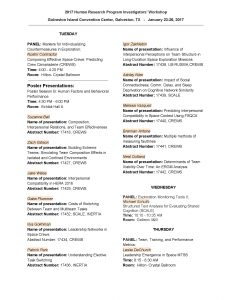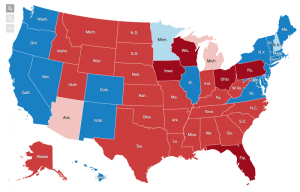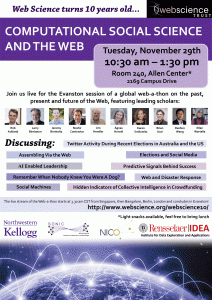On February 13, 2017 Noshir Contractor presented on Bridging the Boundary, while Minding the Seams: Boundary Propensities in Multiteam Systems in a colloquium held at the Center for Work, Technology, and Organization, Management Science & Engineering at Stanford University, CA.
An Ivy League professor says there are only three types of friendships we make
Friendship isn’t always as serendipitous as it might feel. Are you a “tight-knitter”, a “compartmentalizer,” or a “sampler”? According to Dartmouth sociology professor Janice McCabe, whose study of the effects of social connections on academic performance was published this month in the journal Contexts, when forming new friendships, people tend to follow one of these three patterns. McCabe used mathematical models to examine the friendship structures of 67 students on a Midwestern college campus, aiming to figure out how those structures influenced success in the classroom.
Read the full article here.
SONIC and ATLAS members attended the 2017 NASA Investigators’ Workshop in Galveston, TX
SONIC and ATLAS members: eight graduate students, one undergraduate researcher, and two post-doctoral researchers attended the NASA Human Research Program Investigators’ Workshop in Galveston, TX from January 23rd – January 26th.
Our team, together with our collaborators at DePaul, was showcasing eleven posters and presenting on three panels.

You can see the seven SONIC and ATLAS posters here:
Gabe Plummer: The Costs of Switching Between Team and Multiteam Tasks and The Role of Shared Cognition
Brennan Antone: Faulty Analysis: Analyzing Different Faultline Measurement Algorithms for Long-Duration Space Exploration
Zach Gibson: Building Extreme Teams: Simulating team Composition Effects in Isolated and Confined Environments
Patrick Park: Understanding Elective Task Switching
Ashley Niler: Impact of Social Connectedness, Communication Delay, and Sleep Deprivation on Cognitive Network Similarity in Analog Teams
Ilya Gokhman: Leadership Networks in Space Crews
Igor Zakhlebin: Influence of Interpersonal Perceptions on Team Structure in Long-Duration Space Exploration Missions
SONIC PhD candidate Aaron Schecter and Noshir Contractor presented at the Network Science of Squads Workshop
On Sunday, December 4th, a SONIC PhD candidate Aaron Schecter and Professor Noshir Contractor presented at a workshop titled “The Network Science of Squads“, held in Denton, TX on December 3rd – 5th.
An illustration of the relational event model to analyze group interaction processes
Abstract
A fundamental assumption in the study of groups is that they are constituted by various interaction processes that are critical to survival, success, and failure. However, there are few methods available sophisticated enough to empirically analyze group interaction. To address this issue, we present an illustration of relational event modeling (REM). A relational event is a “discrete event generated by a social actor and directed toward one or more targets.” Because REM provides a procedure for modeling relational event histories, it has the ability figure out which patterns of group interaction are more or less common than others. For instance, do past patterns of interaction influence future interactions, (e.g., reciprocity), do individual attributes make it more likely that individuals will create interactions (e.g., homophily), and do specific contextual factors influence interaction patterns (e.g., a complexity of a task)? The current presentation provides an REM tutorial from a multi-team system experiment in which two teams navigated a terrain to coordinate their movement to arrive a common destination point. We use REM to model the dominant patterns of interactions, which included the principle of inertia (i.e., past contacts tended to be future contacts) and trust (i.e., group members interacted with members they trusted more) in the current example.
Noshir Contractor gives a keynote address at the 3rd GESIS Computational Social Science Winter Symposium
On December 1st, 2016, Noshir Contractor presented on Leveraging Computational Social Science to Address Grand Societal Challenges. The symposium, titled “Understanding social systems via computational approaches and new kinds of data”, took place from November 30 – December 1, 2016 at KOMED im MediaPark, Cologne, Germany
The complete schedule of presentations and Noshir’s talk abstract can be viewed following the link below:
How Facebook Saw Trump Coming When No One Else Did
As the electoral map turned crimson this evening, everyone exclaimed that the data and polls had not seen this coming. They were only partly right. At least one overlooked data source had made a very strong suggestion that Donald Trump enjoyed an unquantified current of popular support.
Watch the recorded WebScience@10 – live global birthday party broadcast
SONIC is celebrating the 10th birthday of Web Science – join us!
Please join us in celebrating the 10th birthday of Web Science at Northwestern University – the final stop of a 10-hour web-a-thon that will have spanned the globe from Singapore, Bangalore, Berlin, and London before landing in Evanston.

Twitter bots “Trumping” during this election
How the Bot-y Politic Influenced This Election:
Nearly 20 percent of all election-related tweets come from an army of influential robots.
Read the full article here.
Trump’s Twitter Bots Turned Out on Election Day:
SONIC alumna Alina Lungeanu receives dissertation award
Congratulations to Alina, who received the Northwestern University School of Communication 2016 Graduate Dissertation award, granted annually by the department.
The title of her dissertation is “Assembly Mechanisms of Interdisciplinary Scientific Teams and Their Impact on Performance”.
